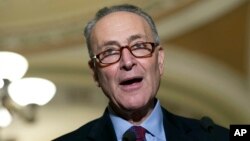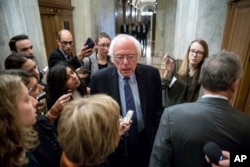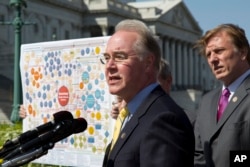Determined to hold around two dozen Senate seats in 2018, Democrats will use the coming series of confirmation hearings to try to distinguish themselves from President-elect Donald Trump's billionaire nominees and convince working-class voters who elected him that he's not on their side.
While Democrats have little leverage to stop the Republican's picks in the Senate, they still plan a fight. To highlight what they say is the hypocrisy of Trump's campaign promise to be a champion for the economically struggling little guy, they'll focus on the nominees' wealth, ties to Wall Street and willingness to privatize Medicare, among other issues. In some cases, they'll seek to drag out the process by demanding more information and ensuring a full airing of potential conflicts of interest.
"We're going to give each of them a thorough examination to determine whether they'll actually stand up for workers against the special interests or rig the system even more,'' said incoming Senate Democratic Leader Chuck Schumer of New York, echoing some of Trump's own campaign rhetoric.
Democrats gave up their ability to block Trump's nominees in 2013, when then-Senate Majority Leader Harry Reid changed Senate rules and reduced the number of votes needed to end filibusters, or procedural roadblocks, on nominations from 60 to a simple majority, usually 51. Republicans, now in the majority, will hold 52 seats when the new session convenes next month.
The limits of the Democratic minority have already been tested, as California Sen. Dianne Feinstein, who will be the top Democrat on the Senate Judiciary Committee in the new session, has repeatedly asked Judiciary Chairman Charles Grassley for more time to review documents ahead of Jan. 10-11 hearings for Sen. Jeff Sessions, Trump's choice for attorney general. Grassley, an Iowa Republican, has declined to delay the hearings.
Still, Democrats are hoping a populist message will resonate outside of Washington, where in the 2018 elections the party faces multiple tough races in deep red states full of white, working-class voters who overwhelmingly supported Trump over Democrat Hillary Clinton this year. Democrats are defending 23 seats, including in states such as North Dakota, Montana, Indiana and West Virginia that went overwhelmingly for Trump and also in once traditional Democratic states that flipped, like Michigan, Pennsylvania and Wisconsin.
Much of their focus will be on the wealthy business executives whom Trump has tapped for his Cabinet - notably Steve Mnuchin, a former Goldman Sachs executive picked to head the Treasury Department.
Other wealthy executives chosen by Trump include Exxon Mobil CEO Rex Tillerson for secretary of state and billionaire investor Wilbur Ross for Commerce. To head the Labor Department, Trump turned to Andrew Puzder, the head of fast food chain CKE Restaurants Holdings who has drawn the ire of labor leaders.
Vermont Sen. Bernie Sanders, a contender for the Democratic presidential nomination whose populist message resonated in some Republican-leaning states, has criticized almost all of Trump's picks, saying they signal he will do the opposite of what he told voters during the campaign.
"That is not the type of change that Donald Trump promised to bring to Washington - that is hypocrisy at its worst,'' Sanders said of Mnuchin's nomination in a joint statement with Massachusetts Sen. Elizabeth Warren.
On policy, Democrats will highlight the fault lines between the nominee and Trump. Georgia Rep. Tom Price, the president-elect's choice to head the Department of Health and Human Services, strongly favors privatizing Medicare, arguing that a voucher system is necessary to ensure its long-term solvency. But Trump repeatedly promised his supporters he wouldn't cut entitlements like Medicare and Social Security.
But Democrats won't fight Trump on every nominee. Many senators up for re-election in 2018 from Trump states say they will pick their battles carefully.
"I think I'll be supporting some of his nominees, I don't think there's any doubt about that,'' said Democratic Sen. Jon Tester of Montana, who faces re-election in a state Trump won by 20 percentage points over Clinton.
Tester said he'd support nominees whom he believes know rural America and "understand what's going on in my neck of the woods.''
West Virginia Sen. Joe Manchin, another Democrat up in 2018, says he plans to be generally supportive of Trump's nominees because he believes an executive should have to answer for his own staff. That is, he said, "unless there's just something scathing coming out that I don't know about.''
Unlike liberal stalwarts Sanders and Warren, the more moderate Senate Democrats are likely to focus their criticism more narrowly. And because Democratic support isn't necessary to confirm Trump's nominees, the senators are freer to choose whom to support without the added pressure of being a needed vote for confirmation.
Democratic Sens. Joe Donnelly of Indiana and Heidi Heitkamp of North Dakota, for example, have expressed concerns about particular nominees. Both are up in 2018.
Donnelly said he will oppose Price because of potential cuts to Medicare.
Heitkamp said she has concerns about Trump's pick to head the Environmental Protection Agency: Scott Pruitt, Oklahoma's attorney general and a frequent critic of environmental regulations and the agency he is tapped to lead. Heitkamp is concerned that Pruitt won't support corn-based ethanol fuel, which is big business in North Dakota.
"If we're going to have an EPA administrator who understands rural America, that means they also have to understand the needs of farmers and want to support those farmers,'' she said.






